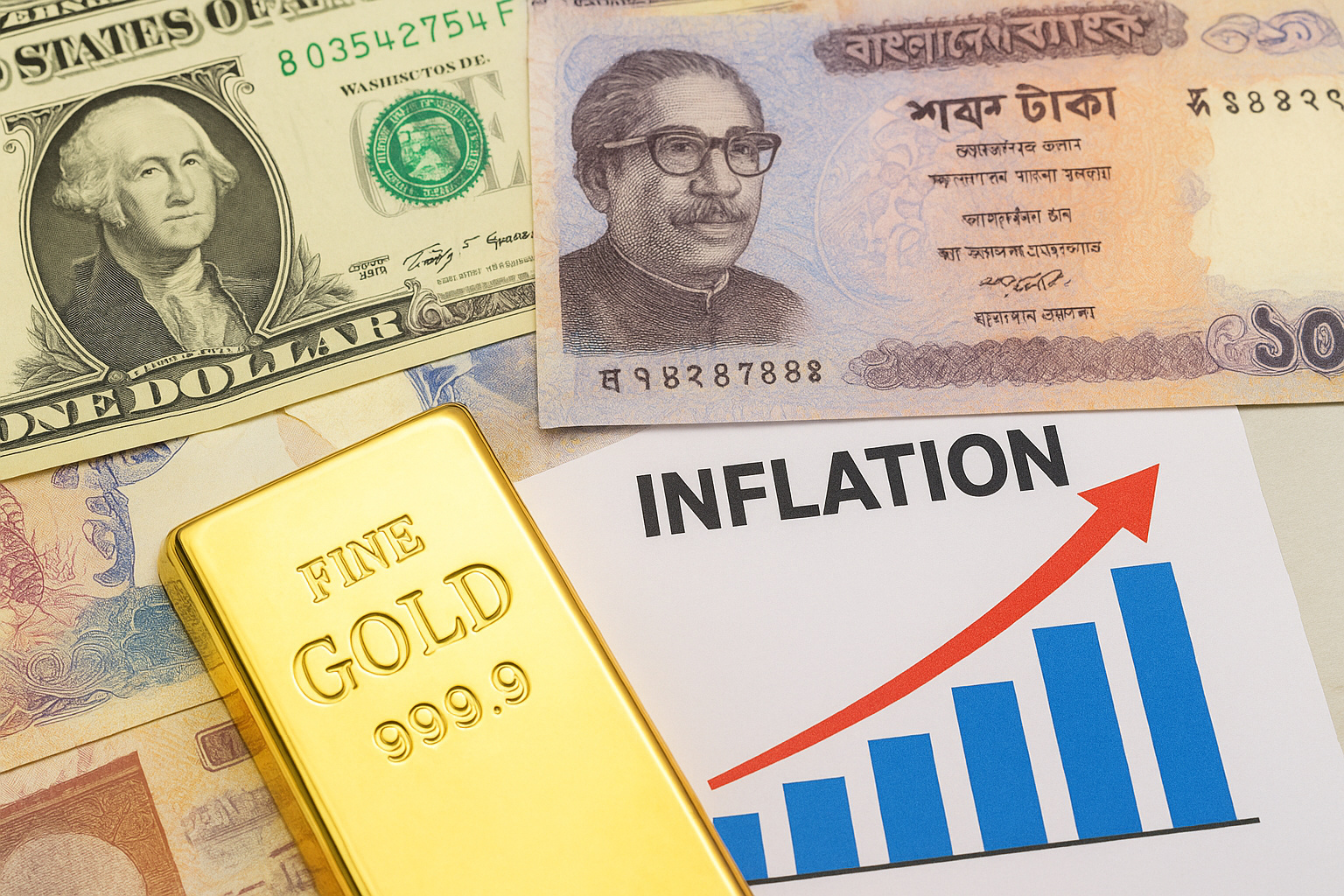

TBT DESK: Money’s value changes over time. What could buy a basket full of goods 25 years ago, now may not even buy a few items. This fall in purchasing power is mainly caused by inflation, currency depreciation, and the global price of gold. This report explains how the value of the Bangladeshi Taka has changed from 2000 to 2025, based on three key indicators — the US dollar rate, the gold price, and inflation.
In the year 2000, one US dollar was worth around Tk 52. That means Tk 1 had stronger value in global terms, and imported goods were cheaper.
By 2025, the exchange rate will climb to about Tk 122 per US dollar. The taka has therefore lost almost 57% of its value against the dollar in 25 years.
In simple words, something that cost Tk 52 in 2000 now costs Tk 122 to buy the same amount in 2025, if measured in dollar value.
The reason is clear — Bangladesh’s trade gap has widened, import bills have increased, and global inflation and currency pressures have weakened the taka. Political and economic instability in major markets also made the dollar stronger worldwide.
When the dollar becomes expensive, it raises the price of fuel, raw materials, and imported goods. That cost passes on to consumers, making everything more costly in local markets.
Gold is one of the oldest and most reliable measures of money’s real value. It shows how much confidence people have in their currency.
In 2000, one bhori (11.66 grams) of 22-carat gold in Bangladesh cost around Tk 5,000–6,000.
In 2025, the same one bhori now costs about Tk 216,000.
That means the price of gold has increased by about 36 times in 25 years. In other words, the taka lost about 97% of its purchasing power compared to gold.
If someone kept Tk 5,000 in cash in 2000, they would buy one bhori of gold at that time. But today, that same Tk 5,000 can’t even buy a single gram of gold.
The sharp rise in gold price shows how paper money has weakened globally. Gold’s value rises when inflation increases, when investors fear financial instability, or when the dollar strengthens. Since 2020, global uncertainty and AI-driven demand for electronics have pushed gold prices to record highs.
Inflation is the gradual increase in the general price level of goods and services. It is another major reason why money loses value.
Between 2000 and 2010, Bangladesh’s average inflation rate was around 6% per year. From 2010 to 2020, it stayed close to 5–6%. But after 2021, inflation started climbing faster due to the COVID-19 pandemic, higher fuel costs, and the dollar shortage. In 2024–2025, the average inflation will be around 9%.
If we calculate the combined effect, Tk 100 in 2000 now has the same buying power as only Tk 25–30 in 2025.
A few daily life examples make this clearer:
In 2000, 1 litre of soybean oil cost around Tk 40. Now it costs Tk 180–190.
1 kg of rice sold for Tk 15–20 in 2000, now sells for Tk 65–70.
A bus fare that was Tk 2–3 is now Tk 20–25.
So, even though the number of taka in people’s hands has increased, what they can buy with that money has decreased greatly.
From this table, it is clear that the taka’s purchasing power has fallen heavily against gold, the dollar, and local inflation. The steepest decline is seen in gold, which indicates that real wealth stored in cash has eroded over time.
Between 2000 and 2025, the value of money has changed dramatically. The taka’s purchasing power fell by more than half against the dollar, by almost 97% against gold, and by around three-fourths when adjusted for inflation.
This means, the same amount of money buys far less today than it did 25 years ago. For ordinary people, this means higher living costs, shrinking savings, and the need for higher income just to maintain the same lifestyle.
On the other hand, property prices, salaries, and remittance inflows have also grown, giving some balance to the economy. But the long-term trend is clear — the real value of the taka has weakened sharply.
To protect future purchasing power, Bangladesh needs stable currency policies, higher export earnings, better inflation control, and investment in value-adding industries.
Only then can the value of money — and people’s standard of living — remain strong in the years to come.
